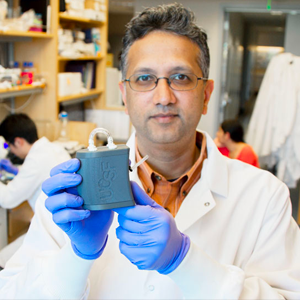$10 million is needed to advance the artificial kidney to clinical trials
What began as a university research project now has the potential to help hundreds of thousands of patients with kidney failure. But the project is outgrowing the traditional grant funding sources available in academia. The quicker this funding can be raised, the faster The Kidney Project can progress to patients. Your gift directly supports this life-saving research. You can magnify your impact by starting a fundraiser with your family, friends, or workplace.
Ways to support The Kidney Project
-

Direct donation to UCSF The Kidney Project
Make a gift today!Accelerate The Kidney Project's fundraising to unlock new phases and reduce the time to clinical trials.
-

Purchase from the Store
Shop MerchandiseWhat better way to contribute than purchasing merchandise from The Kidney Project Store to contribute to the cause while also advocating and sharing with other people when wearing a cool t-shirt or hat.
-

Mantis BBQ Sauce
Purchase your Mantis BBQInspired by our son and co-founders kidney disease, Mantis BBQ contributes 10% of sales to The Kidney Project. Mantis BBQ offers a variety of BBQ sauces and seasonings designed to enhance foods versus overpowering flavors. Delicious with anything cooked on the grill, smoker and more, the sauces and seasonings can also be used in dips, Bloody Mary’s, as marinades and even on ice cream!
-

Start your fundraiser campaign
Giving Together UCSFShare your passion with your community by creating your own personal fundraising page. It’s an amazing way to engage your nearest and dearest in The Kidney Project cause.

Creating a bioartificial kidney as a permanent solution to kidney failure
The Kidney Project is a national research and development collaboration led by bioengineer Shuvo Roy, PhD, at the University of California, San Francisco and William H. Fissell, MD, at Vanderbilt University, to develop the first-ever surgically implantable artificial kidney.
The project aims to offer individuals facing kidney failure an alternative to dialysis — enabling patients to lead a more mobile lifestyle that includes travel, a more liberal diet, and relief from the stress and uncertainty of waiting for a transplant.
Engineered to perform the critical functions of the natural kidney, the bioartificial kidney is powered by the body’s blood pressure, with no external connections or tethers. It is designed to provide continuous treatment, filtering the blood and balancing fluid and electrolyte levels 24 hours a day, and will not require immunosuppression medications.
Donate on the UCSF | Kidney Project Site

The device is about the size of a coffee cup
The bioartificial kidney features a compact hemofilter, or blood filter, made from semiconductor silicon membranes that are efficient enough to use the body’s blood pressure to perform filtration, without pumps or a power supply.
The hemofilter is connected to a bioreactor housing cultured kidney cells that reabsorbs salts and water, regulates blood pressure, and produces vitamin D. This two-stage system replicates key kidney functions, like water balancing and metabolism regulation, that conventional dialysis does not. Incorporating physical and biochemical sensors, the device will be able to detect malfunctions and monitor blood flow, urea clearance, and electrolyte balance.
Information on device performance and the patient’s health status can be wirelessly sent to the patient and healthcare provider.
Saving lives is one click away.
Support The Kidney Project Today
Over the past 15 years, the project has progressed from establishing the scientific foundations and technical methods to showing that the device’s key mechanisms work in animal.
Recently, a small-scale prototype was implanted into a pig and successfully produced urine over 3 days. The researchers’ focus is now on optimizing conditions within the bioreactor to allow the cells to remain healthy for extended periods of time, along with scaling up the surface area of the membranes so the device has the capacity to treat a human patient.
Project leaders estimate that once the necessary funding is secured, the technology is 3-4 years away from being tested in a clinical trial.
-
Unisex Premium Sweatshirt (Multiple colors available)
Regular price From $38.50 USDRegular priceUnit price / per -
The Kidney Project cap
Regular price $23.50 USDRegular priceUnit price / per -
The Kidney Project Sticker
Regular price From $8.50 USDRegular priceUnit price / per -

 Sold out
Sold outPom-Pom Beanie
Regular price $28.75 USDRegular priceUnit price / per -
The Kidney Project Store Gift Card
Regular price From $10.00 USDRegular priceUnit price / per

The Kidney Project Store
The Kidney Project cap
Share











KidneyX Phase II Winner
Immunoprotective Bioreactor for Kidney Cell Encapsulation. This device mimics the native kidney’s nephron architecture by combining a mechanical hemofilter with a biologically inspired bioreactor













